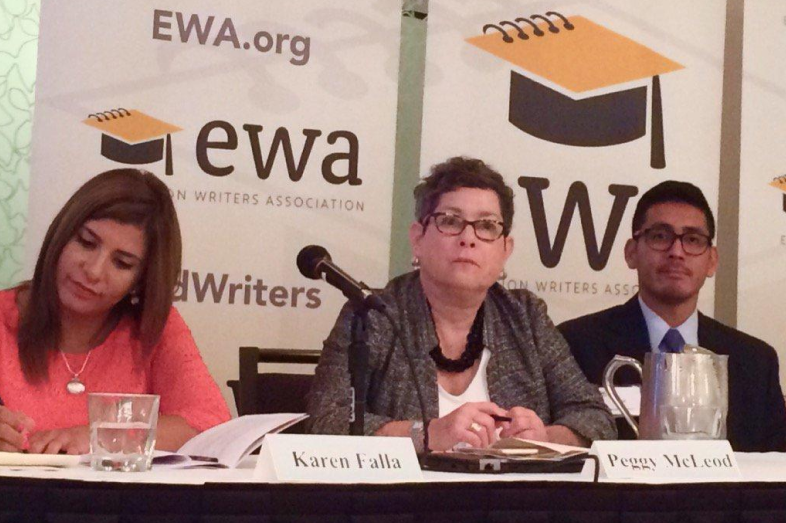

While the number of parents who opt out of having their kids take their states’ standardized tests has grown nationally, much of this movement appears to be made up of white, wealthier families. Latinos and other minorities seem to be less inclined to avoid standardized testing.
That should not be the case, said Ruth Rodriguez, an administrator with United Opt Out National.
“These tests are not reflecting the progress of our children,” Rodriguez told journalists at EWA’s third annual Spanish-language media convening earlier this month in Washington, D.C. She said the people who create many standardized tests are neither educators nor experts in child development.
“These tests are still racist,” Rodriguez said. “All the questions are geared toward Europeans, toward white culture . . . It’s criminal.”
Noting that Albert Einstein and Supreme Court Justice Sonia Sotomayor were said to be poor test-takers, Rodriguez suggested replacing testing with student portfolios.
Her impassioned arguments clash with the approach that’s been taken by many civil rights groups pushing for racial equity in education.
During the panel at the EWA seminar, the National Council of La Raza’s deputy vice president of education and workforce development, Peggy McLeod, said it is valuable to use tests to gauge whether the achievement gaps between different groups of students have changed after each school year.
“Anecdotes are not data,” McLeod said.
McLeod said administering standardized test and tracking scores are “an important part of preserving the rights of Latinos.”
“We should not wait years to see how children are doing,” she said.
José Palma, a graduate investigator at the University of Minnesota, agreed with McLeod. He said tests show “the gap [between Latinos and whites] is very big, but there is progress, little by little.”
“All the children deserve to know where they stand,” he said. “Standardized tests can help us. The community has the right to demand to be shown the evidence.”
“Tests are neither the problem nor the solution. They are an instrument that can inform our decisions,” Palma continued.
But Rodriguez — who has worked as a kindergarten teacher and supporter of parent-teacher collaboration — said she viewed testing as part of a larger strategy to privatize many of the country’s majority-minority districts for profit, citing the expansion of charter schools.
“We Latinos need to understand what is happening,” she said.
Leticia Espinosa, a reporter for Chicago’s Hoy newspaper, sparked perhaps the sharpest debate during the session when she asked Rodriguez why charter schools have long wait lists if they are not more successful than poorly performing traditional schools.
“If the charters are so fabulous, why don’t you see them in school districts where the rich live?” Rodriguez replied.
Again, Palma took the middle ground.
“Some charters are good, others are bad,” he said. “They don’t work for everyone.”